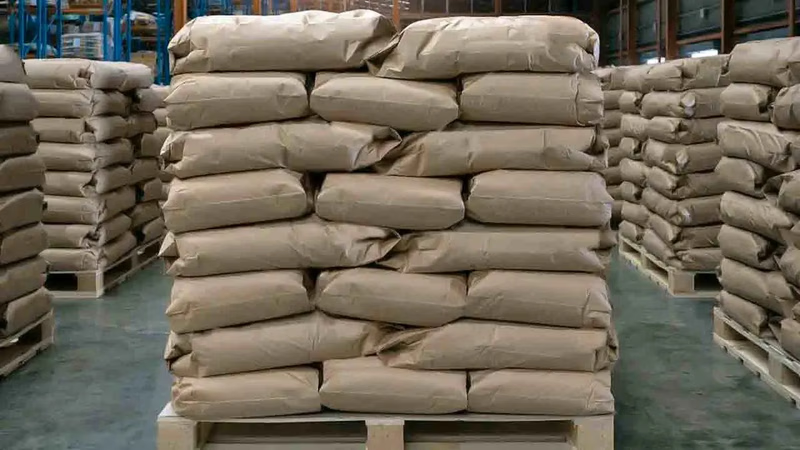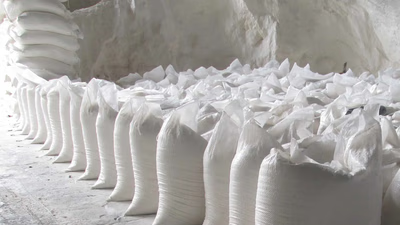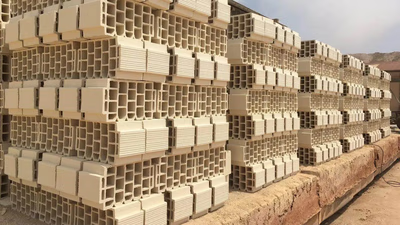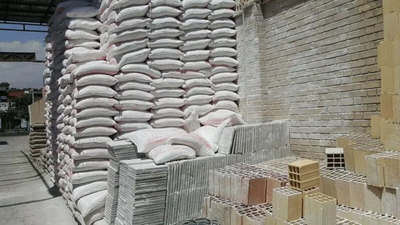
Explore various cement types for construction projects.
OPC is the most widely used type of cement in construction. It is composed of clinker, gypsum, and small amounts of other materials, such as limestone or fly ash. OPC is versatile and suitable for general construction purposes, including the production of concrete, mortar, and grout. PPC is a blended cement that combines OPC clinker with pozzolanic materials, such as fly ash, volcanic ash, or calcined clay. Pozzolanic materials enhance the cement's durability, workability, and resistance to sulfate attacks. PPC is commonly used in areas with aggressive environmental conditions and for mass concrete works.
Rapid hardening cement, also known as high early strength cement, is designed to gain strength quickly. It achieves higher early strength development than OPC, making it suitable for projects with time constraints or where early load-bearing capacity is required. It is commonly used in precast and pre-stressed concrete elements, road construction, and repair works. Sulphate resistant cement is specifically formulated to resist the detrimental effects of sulfate attacks, which can occur in soils or water with high sulfate content. It contains low amounts of Tricalcium aluminate (C3A) and is suitable for structures exposed to sulfate-rich environments, such as foundations, basements, and wastewater treatment plants.
High alumina cement (HAC) is a specialized cement with high alumina content. It offers excellent heat resistance and is used in applications where high temperatures are encountered, such as in refractory linings, kilns, and furnaces. Cement is one of the most widely used building materials and is composed of a combination of calcareous materials such as aluminum oxide and silicon. These Construction Materials are produced in a very soft powder and is provided to the consumer in bulk or in packages. The combination of cement with water creates a hard material called concrete, which plays an important role in strengthening various structures.
- Portland Cement: Portland cement is one of the best types of cement that has a special application in construction. This cement has 1 to 5 types, each of which can be used in different places according to the necessary capabilities and functions.
- Colored cement: Colored cement is created by adding pigment to white cement. This cement creates a smooth and even surface, so it is the best option for covering the facade of the building. Colored cement has high mechanical strength and does not crack.
- Refractory cement: Refractory cement resists high temperatures and heat shock, corrosives, sulfates, abrasions, shocks and acidic waters. This cement hardens faster than Portland cement. Cement is the most important material in construction and it is used for various purposes such as prefabricated parts, tunnels and bridges, road construction and concrete production.
White cement is produced from raw materials with low iron content, such as limestone and kaolin. It has a white appearance and is used primarily for architectural and decorative purposes. White cement is commonly used in the production of tiles, terrazzo flooring, decorative concrete, and for aesthetic finishes where a light-colored appearance is desired. Blended cement is a combination of OPC and supplementary cementitious materials (SCMs), such as fly ash, slag, or silica fume. Blending OPC with SCMs enhances the cement's properties, including workability, durability, and environmental sustainability. Blended cement types include Portland slag cement (PSC) and Portland composite cement (PCC).
Masonry cement is a specialized cement formulation designed for masonry applications, such as brickwork, blockwork, and plastering. It is a combination of OPC and finely ground limestone or other additives. Masonry cement provides good bond strength, workability, and durability for masonry construction. Oil well cement is used in the oil and gas industry for cementing oil wells. It is designed to withstand high temperatures and pressures encountered in deep drilling operations. Oil well cement ensures zonal isolation, preventing fluid migration between different geological formations. Waterproofing cement, also known as hydrophobic cement, contains additives that impart water-repellent properties to the cement paste. It is used in structures exposed to water or moisture, such as basements, swimming pools, and water tanks, to provide enhanced protection against water ingress.
-

Construction sand is essential for concrete and mortar, forming a key part of the aggregate mix used in various construction projects. The rapid growth of the construction sector in West Asia has led to increased demand for sand, necessary for residential, commercial, and infrastructure developments. Countries like the UAE, Qatar, and Saudi Arabia have implemented strict quality standards for construction materials, including sand, to ensure durability and strength. However, local availability varies; some nations depend on imports due to limited natural sources. For instance, Dubai imports sand from Australia for land reclamation projects. Coastal countries like Bahrain and Qatar can source sand locally, but this raises environmental concerns such as coastal erosion. The extraction of sand from riverbeds and coastal areas can disrupt ecosystems and lead to stricter regulations. To address environmental impacts, alternative materials like recycled concrete aggregates and manufactured sand are being explored.
The prices of construction sand fluctuate based on availability, demand, and regulations, affecting overall construction costs. Sustainable sand management practices are being adopted in some West Asian countries to promote responsible sourcing and alternative materials, ensuring the construction industry can meet its needs without compromising the environment.
-

Gypsum plaster is a versatile building material widely used for interior finishes, providing a smooth and durable surface for walls and ceilings. It is a key component of drywall systems, offering benefits such as fire resistance and sound insulation. Gypsum plaster is also essential in repair and restoration work, allowing for the patching and leveling of damaged surfaces. Various types of gypsum plaster, including whitewash, micronized, ivory, Gipton, and Siwa plaster, cater to different construction needs, from decorative elements to moisture resistance. Gypsum plaster can be molded into intricate shapes for architectural detailing and is commonly applied in plaster skimming to achieve a uniform finish. Additionally, it is utilized in the construction of false ceilings, concealing services while enhancing aesthetics. Gypsum plaster"s acoustic properties make it suitable for sound treatment in spaces like theaters and studios. Its inherent fire resistance contributes to building safety, enabling the creation of fire-rated structures. The adaptability of gypsum plaster, combined with its various formulations, makes it a crucial material in the Middle East"s construction industry, supporting both residential and commercial projects.
-

Concrete, steel, bricks, wood, and aggregates are essential materials in civil construction, each offering unique properties. Concrete, a mixture of cement, aggregates, and water, is favored for its strength and versatility. Steel is crucial for structural integrity, providing high strength and corrosion resistance. Bricks, made from clay or concrete, contribute to thermal insulation and aesthetics. Wood is valued for its renewability and insulation properties, while aggregates serve as fillers in various construction applications. Asphalt is used for paving, ensuring durability and smooth surfaces. Cement acts as a binding agent in concrete and mortar, while glass enhances natural light and aesthetics in buildings. Understanding these materials is vital for construction professionals to create durable structures.
The industry also sees innovations with new materials like bitumen membranes and plastic composites, which improve moisture resistance and insulation. Familiarity with both traditional and modern materials is essential for effective construction planning and execution.
-

The Middle East"s construction sector is thriving, fueled by urbanization, population growth, and ambitious development plans. Major cities like Dubai, Abu Dhabi, and Doha are undergoing extensive construction, including skyscrapers and infrastructure projects, driven by government investments aimed at economic diversification. The region"s hosting of mega-events, such as the Dubai Expo 2020 and FIFA World Cup 2022, has further increased demand for building materials. A notable trend is the shift towards sustainable construction practices, with a rising interest in eco-friendly materials and energy-efficient designs. The Middle East is a significant player in the global cement market, exporting millions of tons of clinker, with Iraq being the largest buyer. The building materials market in West Asia includes both locally produced and imported materials, with local production focusing on cement, steel, and ceramics. The competitive landscape features both local companies and international suppliers, catering to diverse material preferences influenced by regional regulations and economic conditions. Advanced construction technologies, such as 3D printing and modular construction, are being adopted to enhance efficiency. Investments in infrastructure development are also substantial, requiring a wide array of building materials, thus presenting lucrative opportunities for suppliers and manufacturers.
-

Cement is a crucial material in construction, with various types serving specific purposes. Ordinary Portland Cement (OPC) is the most widely used, suitable for general construction. Blended cements, like Pozzolanic Portland Cement (PPC), enhance durability and are ideal for aggressive environments. Rapid Hardening Cement is designed for projects requiring quick strength gain, while Sulphate Resistant Cement protects structures from sulfate attacks. High Alumina Cement offers heat resistance for high-temperature applications. Other types include Colored Cement for aesthetic finishes, Refractory Cement for extreme conditions, and Waterproofing Cement for moisture protection. Each type of cement is formulated to meet specific construction needs, ensuring structural integrity and longevity. The choice of cement impacts the overall performance of construction projects, making it essential for builders to understand the properties and applications of each type.
-

Clay is essential in construction, primarily for producing bricks and blocks. It is mixed with water, shaped, and fired to create durable materials. Clay bricks are favored for their thermal insulation and aesthetic appeal, making them ideal for load-bearing walls and facades. Traditional construction techniques like adobe and rammed earth utilize clay mixed with sand and organic fibers, resulting in sustainable structures with excellent thermal mass. Clay also serves as a plastering material, offering breathability and insulation for various surfaces. Additionally, clay roofing tiles are popular for their durability and weather resistance, particularly in hot climates. The soil"s composition, including clay"s fine grains, affects its construction properties. Clay"s ability to stabilize temperature in buildings enhances energy efficiency.
It is also used in drainage systems due to its corrosion resistance. Beyond construction, clay is utilized in landscaping and as a natural liner for landfills. Its thermal insulation properties are harnessed in lightweight clay blocks and aggregates. In geotechnical engineering, clay stabilizes soil and prevents erosion. Eco-friendly clay-based paints are emerging as alternatives to conventional options, promoting healthier indoor air quality. The versatility of clay in construction and landscaping highlights its importance in the Middle East"s trade landscape, particularly within B2B marketplaces focused on regional product listings and verified exporters.






